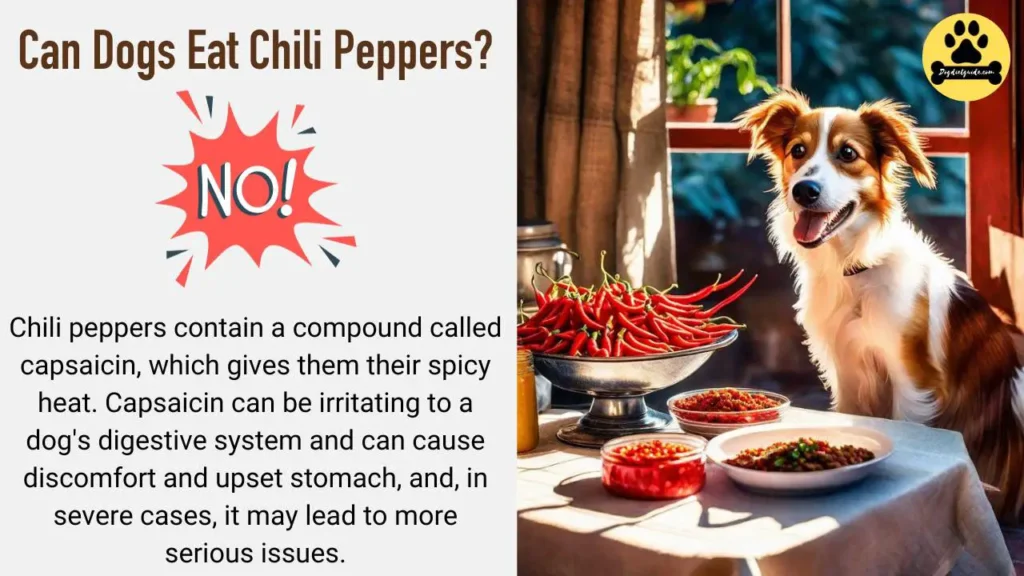Hey there, fellow dog lovers! Have you ever wondered if your furry friend can handle a bit of spice? I know I have! It’s not uncommon to be tempted to share a taste of our favorite dishes with our canine companions, but when it comes to chili peppers, things get a bit tricky. Can dogs eat chili peppers?
As a dog lover, I’ve done my fair share of research on this topic. In this blog post, we’ll dive deep into the world of chili peppers and find out whether they can be a part of our four-legged friend’s diet.
Can Dogs Eat Chili Peppers?
Short Answer: No dogs cannot eat chili peppers. Chili peppers contain a compound called capsaicin, which gives them their spicy heat. Capsaicin can be irritating to a dog’s digestive system and can cause discomfort and upset stomach, and, in severe cases, it may lead to more serious issues.
Ingesting chili peppers can lead to symptoms such as vomiting, diarrhea, abdominal pain, drooling, and excessive thirst. In some cases, it can even lead to more severe reactions like inflammation of the gastrointestinal tract.
If you suspect your puppy has ingested chili peppers or is showing any signs of distress after consuming them, it’s essential to contact your veterinarian immediately. They will be able to provide you with specific advice and recommendations based on your dog’s individual situation.
To ensure your furry friend health and safety, it’s best to avoid feeding them chili peppers or spicy foods. Stick to a balanced and appropriate diet formulated for dogs and consult your veterinarian if you have any concerns about your pet’s diet or health.
Chili Peppers Side Effects For Dogs
The primary concern of peppers for dogs is the presence of capsaicin, the compound responsible for the spicy sensation in peppers. Capsaicin can cause irritation and discomfort in a dog’s digestive system.
If a dog consumes chili peppers, it may experience digestive distress. This can manifest as vomiting, diarrhea, or abdominal pain. The severity of these symptoms can vary depending on the quantity and type of chili pepper ingested.
Some dogs may be more sensitive to chili peppers than others. Allergic reactions can occur, leading to itching, hives, or difficulty breathing. In severe cases, anaphylaxis may occur, which requires immediate veterinary attention.
Ingesting whole or large pieces of chili peppers can potentially lead to gastrointestinal blockage. This is particularly concerning if the seeds are consumed, as they are small and hard, making them difficult to pass through the digestive tract.
Benefits of Chili Peppers For Dogs
In controlled amounts, it can serve as a natural pain reliever and anti-inflammatory agent.
Some pet owners use capsaicin-containing creams or ointments for topical pain relief in dogs.
How Much Chili Peppers are Toxic To Dogs?

The level of toxicity depends on the type and amount of chili pepper consumed, as well as the individual dog’s sensitivity.
Even small amounts of chili peppers can cause mild gastrointestinal upset in dogs, including symptoms like drooling, vomiting, diarrhea, and abdominal pain. Ingesting larger quantities of chili peppers can lead to more severe reactions, including:
- Severe gastrointestinal upset
- Difficulty breathing (if there is airway irritation)
- Elevated heart rate
- Tremors or seizures
- Collapse or loss of consciousness (in extreme cases)
It’s important to note that some dogs may be more sensitive to capsaicin than others, so that the effects can vary from one individual to another.
What Should I do if My Dog Eats Chili Peppers?
If you suspect your dog has consumed chili peppers or any spicy food, it’s best to contact your veterinarian or an emergency animal clinic immediately. They can provide specific advice based on the type and amount ingested, as well as the size and health of your dog.
They may recommend monitoring at home, inducing vomiting, or bringing your puppy in for examination and treatment.
In general, it’s best to avoid feeding dogs spicy or highly seasoned foods, including chili peppers, to prevent potential harm.

Safer Alternatives
Rather than risking potential harm with chili peppers, there are safer alternatives that can provide similar health benefits.
Turmeric, for example, contains a natural compound called curcumin, which has anti-inflammatory properties and is generally safe for dogs.
FAQs
Can dogs eat red chili peppers?
No, dogs should not eat red chili peppers. They contain capsaicin, which can harm dogs and cause digestive issues.
Can dogs eat hot chili peppers?
Dogs should not eat hot chili peppers, as they also contain capsaicin and can lead to gastrointestinal discomfort.
Can dogs eat green chili peppers?
Green chili peppers pose the same risk to dogs due to their capsaicin content. It’s best to avoid feeding them to your pet.
Can dogs eat chili peppers and tomatoes?
While tomatoes are generally considered safe for dogs, the combination with chili peppers can cause digestive upset. It’s better to avoid giving them together.
Can dogs eat chili peppers raw?
Dogs can eat chili peppers raw, but it’s not recommended due to the potential irritation from capsaicin.
Why do dogs love peppers?
Dogs may be attracted to the smell and taste of peppers, but it’s essential to be cautious since they can have adverse effects on their digestive system.
What happens if my dog eats a chili?
If your dog eats chili, they may experience symptoms like drooling, vomiting, diarrhea, or discomfort due to the capsaicin.
Are spicy peppers toxic to dogs?
Yes, spicy peppers are toxic to dogs because of their capsaicin content, which can lead to digestive issues and discomfort.
Final Thoughts: Can Dogs Eat Chili Peppers?
In conclusion, while chili peppers may offer certain health benefits for dogs, the risks associated with their consumption outweigh the potential advantages. It’s best to err on caution and avoid feeding chili peppers to your furry friend.
If you’re seeking natural remedies for pain or inflammation, consult your veterinarian for safer alternatives.
Remember, your pet’s well-being is of the utmost importance, and making informed decisions about their diet is an essential part of responsible pet ownership.
Resources:
https://www.thedogbakery.com/blogs/news/can-dogs-eat-peppers




![Can Dogs Eat Blood? 7 Side Effects [Expert Opinion]](https://petskor.com/wp-content/uploads/2022/04/Webp.net-resizeimage-12.jpg)
